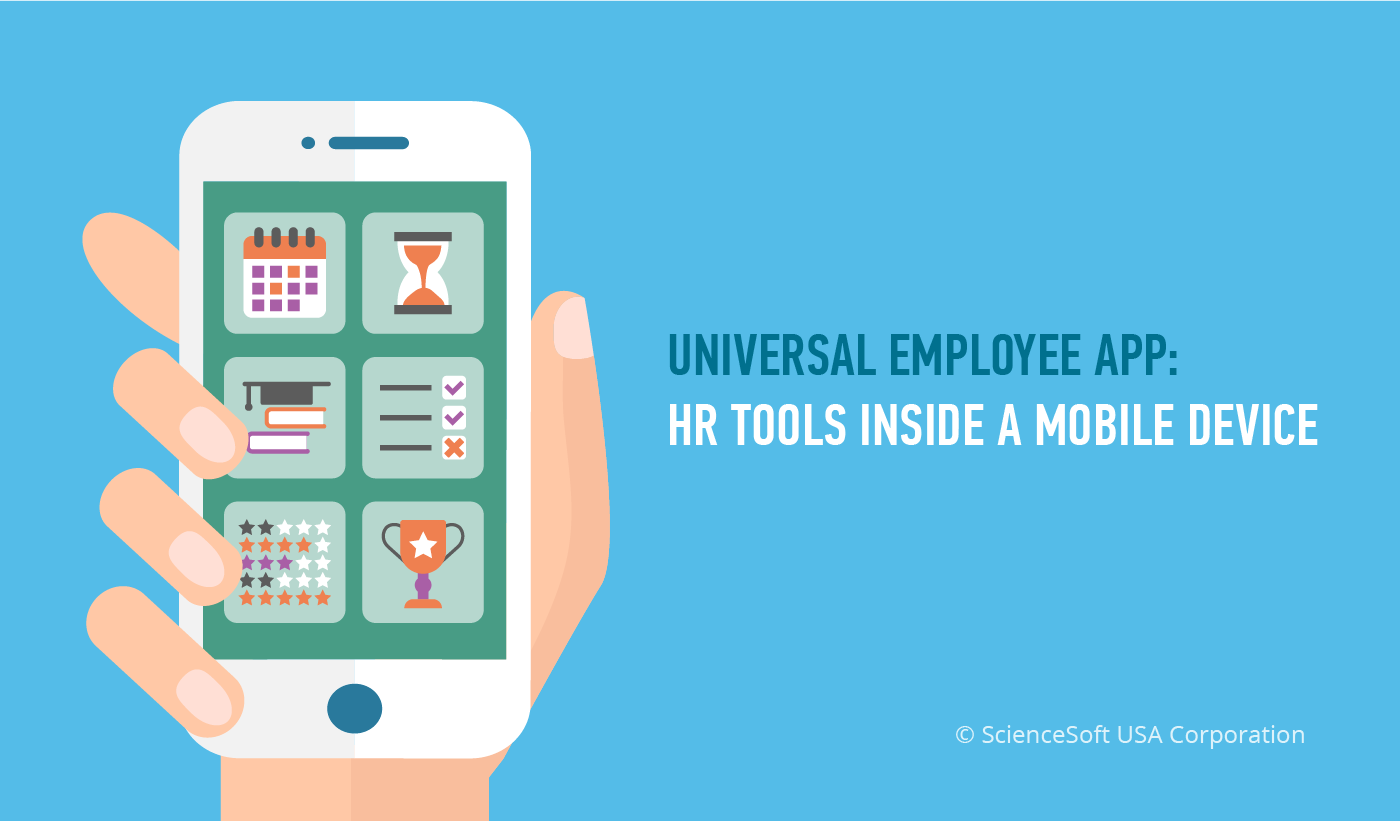One of the most dedicated supporters of enterprise mobility, Gartner has been long predicting its well-off future. In its latest report, Gartner stated that the evolution of enterprise mobility will be taking shape of large application stores of job-specific apps. Needless to say, there are solid grounds for such a view: job-specific mobile apps foster productivity and help to sharpen the business, regardless of the industry.
The idea of enterprise apps also offers great possibilities for HR departments. Installed on mobile devices and carried anywhere, these apps help HR managers be but a few steps away from employees, even when the latter are on a sick leave, on vacation or just out of office.
The universality comes from the fact that all possible HR tools can be brought together within a single app available to the entire staff. Through it, employees can access their schedule, place a day-off request or look through their company’s staff list in the knowledge base, while HR managers can send out job satisfaction surveys, provide mobile-optimised training and easily reach to any employee when needed.
What makes a success?
Implementing one feature or 10 isn’t an issue; making these features click with the audience is. If employees find value in using a mobile app every day, then the whole endeavour can be considered successful.
The challenge of creating a successful app gets even trickier with universal employee apps. While keeping them multi-functional, it is important for apps to appeal to diverse roles within a company without being overwhelming.
Ultimately, a successful universal app should be a) easy to follow, b) helpful and worth to turn to, and c) fun and interesting to use. Therefore, it’s necessary to focus on 3 main success factors: convenience, value and entertainment.
Now, let’s translate these factors into the language of technology, so that you can be on the same page with mobile app development companies.
Convenience = user experience
Universal app functions are interconnected yet independent. For users to easily find the necessary feature, it should be possible to shift from one feature’s home screen to another anytime, and not just from the main menu.
Overall, convenience should be prioritised over functionality. It’s better to create an app with one feature and have people use it than focus on functionality and get a bulky and cumbersome app in the end. It even makes sense to let employees try out an app prototype and gather their feedback while development is still in progress to make sure they will be satisfied with the result.
Only when feeling comfortable with design and navigation, employees will be able to trust a universal app instead of being frustrated with its one-size-fits-all offering.
Value = functionality
Enterprise mobile apps can offer a lot in terms of functionality to employees of all industries, but they are most indispensable for those who don’t have a steady working place with access to a PC or spend their workdays in the field. Backing up any HR manager’s tasks, technologies can implement a wide range of various features usually accessible from a computer, such as:
- a schedule (to promptly notify managers about a planned time-off, set preferences and ask colleagues for a shift swap),
- a knowledge base (to get general information on the company),
- a training module with learning sessions (to upgrade skills, to learn and practice).
Another feature, a feedback scale, may not provide an instant value, yet be rewarding in the long run. As employees will be rating their experience of the working day they have just finished, HR managers will be able to detect both negative and positive patterns in a working schedule or in the environment overall. This data will certainly be of use to make changes for the better.
Entertainment = gamification
Adding entertaining elements to an enterprise app may seem an unnecessary waste of budget and time. Still, it can prove to be a solid investment in the long-standing buy-in for any employee app.
Gamification principles have been in use since early 2000s, and are now acknowledged as effective ways of engaging people in any sort of activity. Awards and achievements for daily logging in an app throughout a week or a month can be a good trigger to help the staff get used to the app right after its launch. Later, the motivation to open the app can transform into the motivation to engage and unlock achievements by excelling in any of the feature-based activities. Users can be praised with virtual awards for such actions as:
- contributing to the knowledge base and informing about errors it contains
- completing training sessions and upgrading to a new mastery level
- kindly doing sick colleagues a favour and accepting an urgent substitute shift for three or more times
This way, a universal employee app will add a small but visible purpose to such notions as efforts and commitment.
Conclusion
The scope of functions contained within a universal employee app is just what its name suggests – universal. This provides a space for a variety of handy features, such as corporate training, schedule access, surveys and feedback that are specifically discussed in our blog post. Additionally, a mobile app with gamification elements can even boost employees’ work motivation and improve their mood. And what else, if not highly productive and motivated employees, is every HR manager’s goal?






